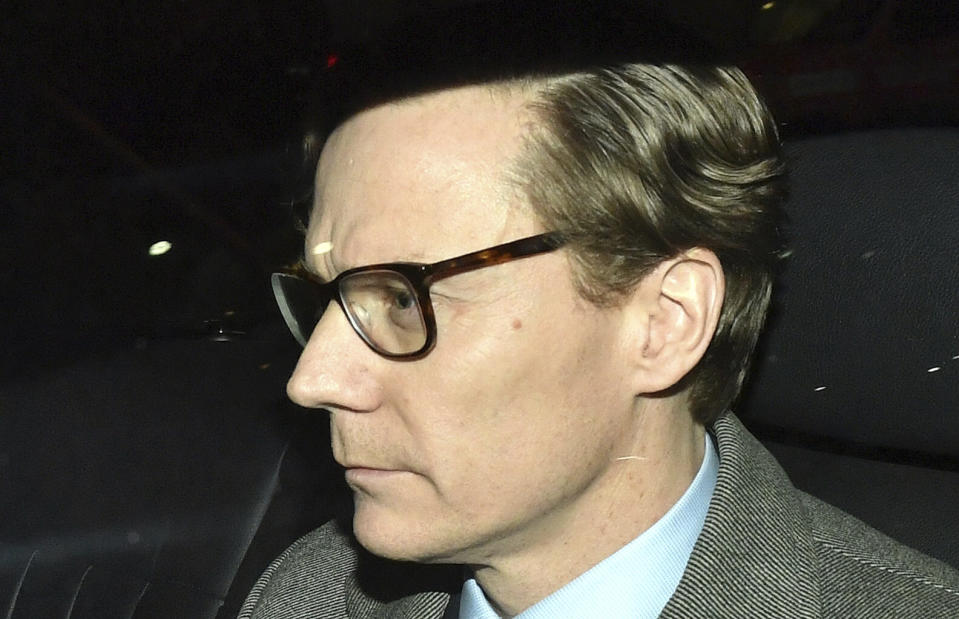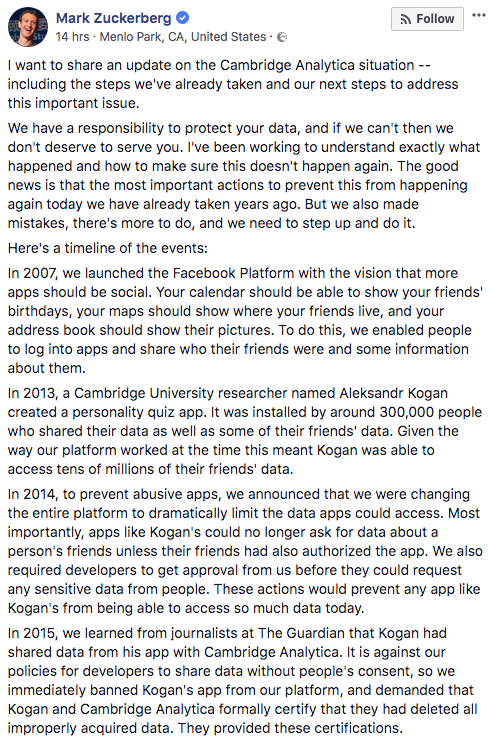Mark Zuckerberg blames British data firm over Facebook scandal
Mark Zuckerberg has apologised over the Facebook scandal.
The billionaire CEO said it was “clearly a mistake” to trust Cambridge Analytica when they asked the British data firm to delete tens of millions of users’ data.
He said he was sorry and admitted he had let users down.
‘I am really sorry that this happened,” he said in an interview with CNN on Wednesday. ‘We have a basic responsibility to protect people’s data, and if we can’t do that, then we don’t deserve the opportunity to serve people.’
He said CA had provided formal assurances that data harvested from 50 million profiles had been destroyed after the breach was revealed in 2015.
“I don’t know about you, but I’m used to when people legally certify that they are going to do something, that they do it. But I think this was clearly a mistake in retrospect,” Mr Zuckerberg added.
The billionaire, who has been called on to give evidence to MPs in person over the scandal, also said he would be happy to testify in front of US Congress ‘if it’s the right thing to do’.
On Wednesday night, Zuckerberg broke four days’ of silence and admitted that his company had ‘made mistakes’ over the Cambridge Analytica scandal.
He pledged to introduce measures to protect Facebook users’ data.
In a statement, Zuckerberg said: ‘I want to share an update on the Cambridge Analytica situation — including the steps we’ve already taken and our next steps to address this important issue.

‘We have a responsibility to protect your data, and if we can’t then we don’t deserve to serve you.
‘I’ve been working to understand exactly what happened and how to make sure this doesn’t happen again.
‘The good news is that the most important actions to prevent this from happening again today we have already taken years ago. But we also made mistakes, there’s more to do, and we need to step up and do it.’

But Culture Secretary Matt Hancock said the measures announced by Facebook boss Mark Zuckerberg do not go far enough.
‘I saw overnight that Mark Zuckerberg has apologised and said that they are going to make some changes, but frankly I don’t think those changes go far enough,” he told BBC Radio 4’s Today.
‘It shouldn’t be for a company to decide what is the appropriate balance between privacy and innovation and use of data, those rules should be set by society as a whole and so set by Parliament.’
The scandal has prompted many to consider deleting their Facebook profile.
In a bid to offer some clarity over the data mining scandal, Zuckerberg also included a timeline of Facebook’s relationship with Cambridge Analytica.
This can be seen on his Facebook post below:

He added: ‘I started Facebook, and at the end of the day I’m responsible for what happens on our platform. I’m serious about doing what it takes to protect our community.
‘While this specific issue involving Cambridge Analytica should no longer happen with new apps today, that doesn’t change what happened in the past.
‘We will learn from this experience to secure our platform further and make our community safer for everyone going forward.’
Until this evening, Zuckerberg and Facebook’s No 2 executive, Sheryl Sandberg, had remained quiet since the news broke on Friday that Cambridge may have used data improperly obtained from roughly 50 million Facebook users to try to sway elections.

 Yahoo News
Yahoo News 
